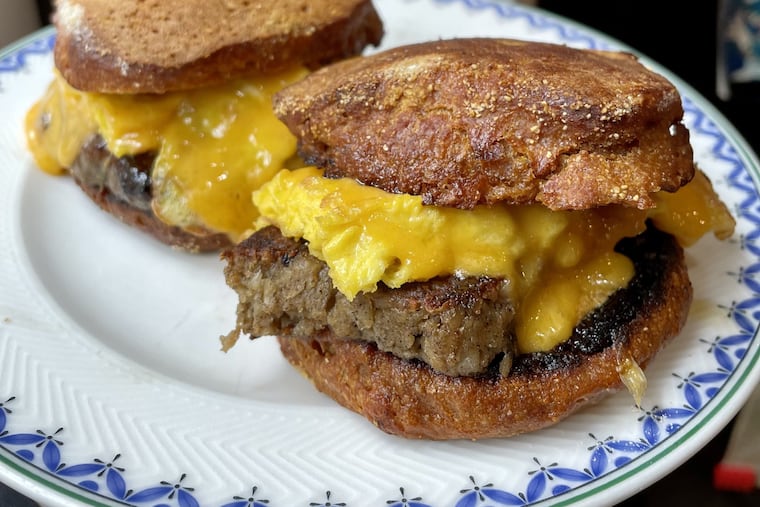Long-awaited Honeysuckle Provisions gets rolling with weekend breakfast boxes
Honeysuckle Provisions is producing breakfast box meal kits featuring ingredients raised by local Black farmers.

In late September, I found a thriving farm in the West Philly shadows of the Market-Frankford El at 46th and Market. The crew from Honeysuckle Projects was carefully tending the rows of soil and grass that form the narrow, quarter-acre slip of land there that is Max Paul Park. And chef Omar Tate, the cofounder of Honeysuckle with his wife, the chef Cybille St. Aude-Tate, could not be more thrilled at the harvest.
“These are black-eyed peas!” he said, pulling a fistful of the slender beans off the leafy vines and splitting one open to reveal a pod lined with tiny cowpeas dotted with the telltale black spot.
The pole bean harvest was impressively plentiful for Honeysuckle’s very first crop — 50 pounds of peas once shelled, according to St. Aude-Tate. It was enough to name the stray kitten that prowled the farm and snuggled the working farm crew “Cowpea” in honor of their seasonal bounty.
The farm, which was launched last summer in partnership with the Enterprise Center, was one of the first steps in the long-anticipated realization of Honeysuckle, a planned cafe, market, and community center built around a celebration of Black food culture that the Tates have been fund-raising and building toward since June of 2020.
A small market and commissary kitchen at 310 S. 48th St. near Spruce Street, also in partnership with the Enterprise Center, has finally given them a foothold on their culinary work, with hopes to open the space for takeout by this summer. Honeysuckle has already been connecting with the public by producing breakfast box meal kits featuring some of the provisions, crafted largely from ingredients raised by local Black farmers, that will be staples of the market.
Among the highlights of the $40 box I picked up recently from a Sunday pop-up at Friday Saturday Sunday were the BLACKenglish muffins made from the flour of dehydrated sweet potatoes. The use of sweet potatoes, which also infused a whipped butter in the box, are an ode to the agricultural work of George Washington Carver. The muffin’s name — a nod to the 1979 James Baldwin essay “If Black English isn’t a language, then tell me, what is?” — is a perfect example of the Tates’ talent for weaving Black cultural, artistic, and historical references into everything they do.
There were multicolored eggs from Smith Poultry in South Jersey, patties of fresh pork sausage, oranges to juice, and oatmeal cream pie for dessert. But the most memorable treasure was an inventive plant-based alternative to that sausage, a vegan scrapple made from corn meal, oats, and ground black-eyed peas straight from Honeysuckle’s farm harvest. The veggie scrapple’s easily crisped exterior and creamy center was spot-on, a satisfying pork-free stand-in for classic scrapple.
» READ MORE: For Omar Tate, a celebrate homecoming and culinary activism
The idea to make that black-eyed pea scrapple was the result of a collaboration between farmer-cooks Sterling Pope and Aya Iwatani, farm manager Elaine Holton, and Jamaar Julal of JamBrü, who fermented a black-eyed pea miso dubbed “piso” that’s used to add extra flavor depth.
The creation already holds a special place in Honeysuckle’s evolution, says St. Aude-Tate: “It’s literally from our farm to your table, and represents the entirety of what Honeysuckle is about: We grew our own (peas) and incorporated them into a spin on everyday ingredients that is culturally representative of the Philly community we’re serving.”
Honeysuckle’s target audience, St. Aude-Tate says, are families in low-income or marginalized neighborhoods experiencing food insecurity. Their initial plan to open a larger community center built around food in Mantua is on hold while they search for the right space. Meanwhile, their current location, which is near University City and the 52nd Street corridor, offers access to Honeysuckle’s concept for a broad cross-section of Philadelphians, says St. Aude-Tate. She expects to start selling lunch boxes next month, as well.
“Navigating business during the pandemic has been a challenge,” she said, noting they’ve raised $130,000 through an ongoing GoFundMe campaign that allowed them to hire their staff. “We just didn’t want to wait around anymore for the perfect space. Starting to gather is fundamental, and this (farm and these boxes) give us the opportunity to get ourselves out there and begin serving a part of Philadelphia that is unique.”
With spring planting already underway at the farm for Honeysuckle’s next growing season in West Philadelphia, there’s no time to waste.
— Craig LaBan
Weekend breakfast boxes, $40, reserved in advance at Honeysuckle Provisions, 310 S. 48th St. (at Spruce Street); honeysucklephl.com.